(沪教版)初二下册英语知识点
沪教版初中英语八年级下册Unit 7单词知识点梳理
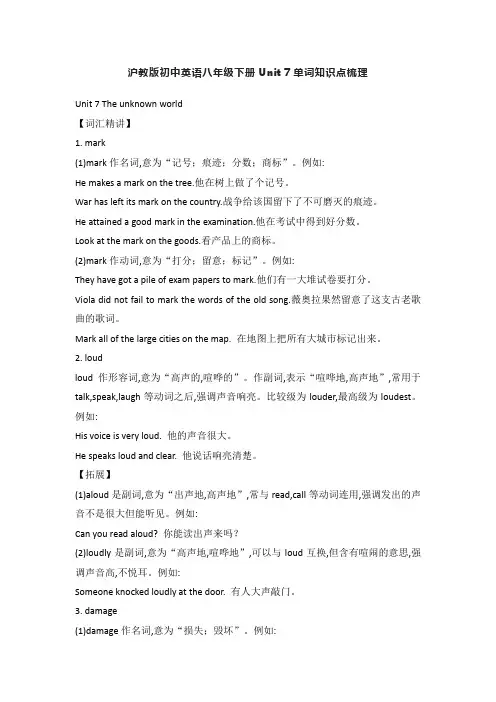
沪教版初中英语八年级下册Unit 7单词知识点梳理Unit 7 The unknown world【词汇精讲】1. mark(1)mark作名词,意为“记号;痕迹;分数;商标”。
例如:He makes a mark on the tree.他在树上做了个记号。
War has left its mark on the country.战争给该国留下了不可磨灭的痕迹。
He attained a good mark in the examination.他在考试中得到好分数。
Look at the mark on the goods.看产品上的商标。
(2)mark作动词,意为“打分;留意;标记”。
例如:They have got a pile of exam papers to mark.他们有一大堆试卷要打分。
Viola did not fail to mark the words of the old song.薇奥拉果然留意了这支古老歌曲的歌词。
Mark all of the large cities on the map. 在地图上把所有大城市标记出来。
2. loudloud作形容词,意为“高声的,喧哗的”。
作副词,表示“喧哗地,高声地”,常用于talk,speak,laugh等动词之后,强调声音响亮。
比较级为louder,最高级为loudest。
例如:His voice is very loud. 他的声音很大。
He speaks loud and clear. 他说话响亮清楚。
【拓展】(1)aloud是副词,意为“出声地,高声地”,常与read,call等动词连用,强调发出的声音不是很大但能听见。
例如:Can you read aloud? 你能读出声来吗?(2)loudly是副词,意为“高声地,喧哗地”,可以与loud互换,但含有喧闹的意思,强调声音高,不悦耳。
例如:Someone knocked loudly at the door. 有人大声敲门。
牛津沪教版英语八年级下 Unit1-Unit2语法知识点整合
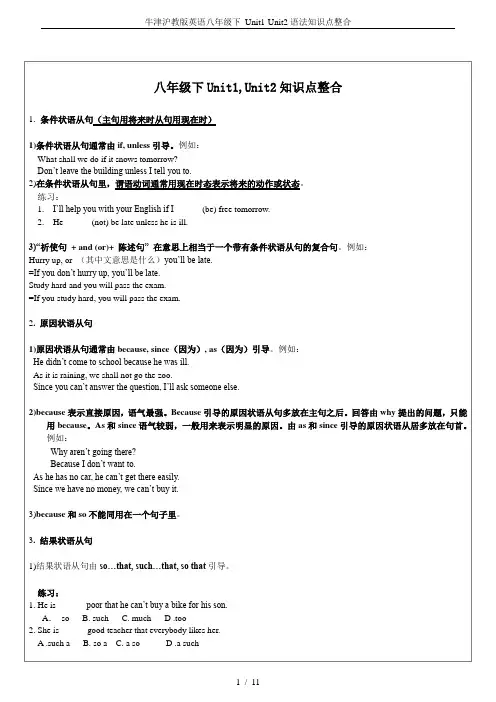
A .don't make B. not make C. not making D .not to make8. An army spokesman stressed that all the soldiers had been ordered _____clear warnings before firing any shots.A .to issue B. being issued C. to have issued D. to be issued9. I'd rather have a room of my own, however small it is, than_______ a room with someone else.A. to shareB. to have sharedC. shareD. sharing10. The bank is reported in the local newspaper_________ in broad daylight yesterday.A. robbedB. to have been robbedC. being robbedD. having been robbed11. A number of paintings in the castle are believed ________in a fire.A. being destroyedB. having been destroyedC. to be destroyedD. to have been destroyed12. The meeting _______ next week is sure to be a great success.A. to take placeB. to be taken placeC. to have taken placeD. being taken place13. As a result of my laziness, I failed ________ my work in time.A. and finishedB. to finishC. and finishingD. to finished14. I am sorry ______ written you a letter at the time.A. to have notB. to not haveC. not to haveD. not having15. Will you lend him a magazine _________?A. to be readB. for readingC. to readD. he read16. He could do nothing but _______for the bus _________.A. wait, to comeB. wait; comeC. waiting; comingD. waited; came17 .It is a problem that doesn't need ________ right now.A. to solveB. solvingC. being solvedD. to be solving18. There's a man at the reception desk who seems very angry and I think he means _______ trouble.A. makingB. to makeC. to have madeD. having made19. I remember _______him _______the bike needed __________.A. hearing, saying, to repairB. to hear, say, to repairC. hearing, say, repairingD. to hear, saying, to be repaired20. --- You should have thanked her before you left.--- I meant _________, but when I was leaving I couldn't find her anywhere.A. to doB. toC. doingD. doing so21. Robert is said to __________ abroad, but I don't know what country he studied in.A. to have studiedB. to study B. to be studying D. to have been studying22. I'm gong to Xi'an next week. Have you anything __________ to your parents?A. to takeB. to be takenC. to be bought toD. to buy23. when are they __________ in their plan?A. handB. handedC. to handD. give24. In such dry weather, the flowers will have to be watered if they _____________.A. have survivedB. are to surviveC. would survivedD. will survive25. When we hurried to the station, there happened ________ no bus at that time.A. to haveB. to beC. havingD. being26. I lost my way in complete darkness and, _________ matters worse, it began to rain.A. madeB. having madeC. makingD. to make27. At ________ time does the salesgirl get up late in the morning, though she is always too busy _________a good rest.A. no, to takeB. no, takingC. any, to takeD. one, taking28. --Are you a student? --No, but I used _________.A. to beB. to wasC. to doD. to be a29. I stopped to listen, and my son seemed _________ himself _________ in the living room.A. to enjoy, to shutB. to be enjoying, shuttingC. to be enjoying, shutD. to have enjoyed, having shut30. With a lot of difficult problems _________, the newly-elected president is having a hard time.A. settledB. settlingC. to settleD. being settled31. We're leaving at six o'clock, and hope _________ most of the journey by lunch time.A. to doB. to have doneC. to makeD. to have made32. The study of the wild world may help to make the world easier _________.A. understoodB. to be understoodC. to understandD. understand33. Who will you get __________ the project for us?A. designB. to designC. designedD. designing34. It is said in Australia there is more land than the government know __________.A. it what to do withB. what to do it withC. what to do with itD. to do what with it35. We are not allowed __________ outdoors with some other children.A. playingB. to be playingC. to playD. be playing36. Allen had to call a taxi because the box was _________ to carry all the way home.A. much too heavyB. too much heavyC. heavy too muchD. too heavy much37. She feels so strongly that each of us should have a role __________in making the earth a better place to live in.A. to have playedB. to playC. to be playedD. to be playing38. When I handed the report to John, he said that George was the person _________.A. to sendB. for sending itC. to send it toD. for sending it to39. Do let your mother know all the truth, she appears _________ everything.A. to tellB. to be toldC. to be tellingD. to have been told11 / 11。
上海八年级沪教版英语下册知识点
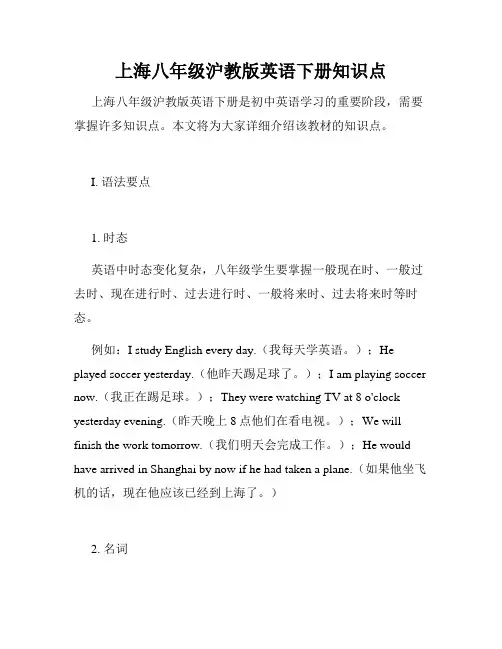
上海八年级沪教版英语下册知识点上海八年级沪教版英语下册是初中英语学习的重要阶段,需要掌握许多知识点。
本文将为大家详细介绍该教材的知识点。
I. 语法要点1. 时态英语中时态变化复杂,八年级学生要掌握一般现在时、一般过去时、现在进行时、过去进行时、一般将来时、过去将来时等时态。
例如:I study English every day.(我每天学英语。
);He played soccer yesterday.(他昨天踢足球了。
);I am playing soccer now.(我正在踢足球。
);They were watching TV at 8 o'clock yesterday evening.(昨天晚上8点他们在看电视。
);We will finish the work tomorrow.(我们明天会完成工作。
);He would have arrived in Shanghai by now if he had taken a plane.(如果他坐飞机的话,现在他应该已经到上海了。
)2. 名词八年级学生需要掌握可数名词、不可数名词、复数、所有格等基本名词概念。
同时需要掌握名词的作用,例如主语、宾语、表语、定语等。
例如:There are three apples on the table.(桌子上有三个苹果。
);There is some milk in the glass.(杯子里有一些牛奶。
);Her parents are doctors.(她的父母是医生。
);The dog's tail is shaking.(狗的尾巴在摇晃。
);My sister's bike is red.(我妹妹的自行车是红色的。
)3. 情态动词情态动词包括can、could、may、might、must、shall、should、will、would 等。
八年级学生需要掌握情态动词的用法,例如表示许可、可能、必须、应该等。
沪教牛津 初中 英语 八年级下册(八下)
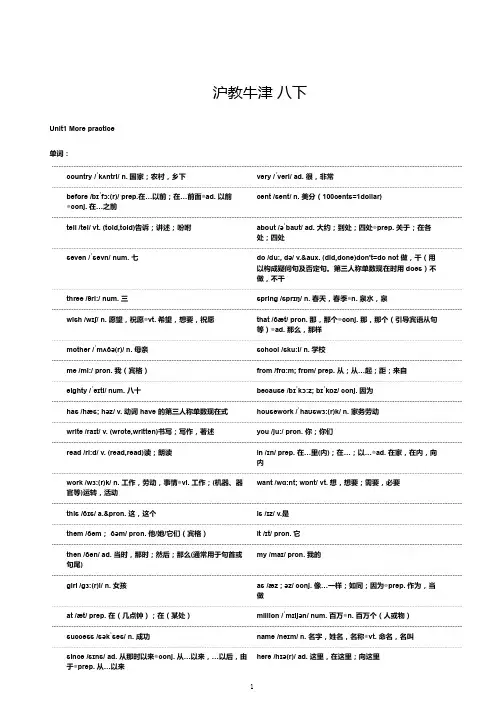
country/ˈkʌntri/n. 国家;农村,乡下very/ˈveri/ad. 很,非常before/bɪˈfɔ:(r)/prep.在…以前;在…前面◎ad. 以前◎conj. 在…之前cent/sent/ n. 美分(100cents=1dollar)tell/tel/vt. (told,told)告诉;讲述;吩咐about/əˈbaʊt/ad. 大约;到处;四处◎prep. 关于;在各处;四处seven/ˈsevn/num. 七do/du:, də/v.&aux. (did,done)don't=do not 做,干(用以构成疑问句及否定句。
第三人称单数现在时用 does)不做,不干three/θri:/num. 三spring/sprɪŋ/n. 春天,春季◎n. 泉水,泉wish/wɪʃ/n. 愿望,祝愿◎vt. 希望,想要,祝愿that/ðæt/pron. 那,那个◎conj. 那,那个(引导宾语从句等)◎ad. 那么,那样mother/ˈmʌðə(r)/n. 母亲school/sku:l/n. 学校me/mi:/pron. 我(宾格)from/frɑ:m; frɒm/ prep. 从;从…起;距;来自eighty/ˈeɪti/num. 八十because/bɪˈkɔ:z; bɪˈkɒz/conj. 因为has/hæs; həz/v. 动词 have 的第三人称单数现在式housework/ˈhaʊswɜ:(r)k/n. 家务劳动write/raɪt/v. (wrote,written)书写;写作,著述you/ju:/pron. 你;你们read/ri:d/ v. (read,read)读;朗读in/ɪn/prep. 在…里(内);在…;以…◎ad. 在家,在内,向内work/wɜ:(r)k/n. 工作,劳动,事情◎vi. 工作;(机器、器官等)运转,活动want/wɑ:nt; wɒnt/ vt. 想,想要;需要,必要this/ðɪs/a.&pron. 这,这个is/ɪz/v.是them/ðem; ðəm/pron. 他/她/它们(宾格)it/ɪt/pron. 它then/ðen/ ad. 当时,那时;然后;那么(通常用于句首或句尾)my/maɪ/pron. 我的girl/gɜ:(r)l/ n. 女孩as/æz ; əz/ conj. 像…一样;如同;因为◎prep. 作为,当做at/æt/prep. 在(几点钟);在(某处)million/ˈmɪljən/ num. 百万◎n. 百万个(人或物)success/səkˈses/n. 成功name/neɪm/n. 名字,姓名,名称◎vt. 命名,名叫since/sɪns/ad. 从那时以来◎conj. 从…以来,…以后,由于◎prep. 从…以来here/hɪə(r)/ad. 这里,在这里;向这里沪教牛津八下Unit1 More practice单词:other/ˈʌðə(r)/pron. 别人,别的东西◎a. 别的,另外的for/fɔ:(r); fə(r)/prep. 为了…;向…,往…;与…交换;防备…;适合…;因为…;在…期间;对于…;对…来说◎conj. 因为,由于I/aɪ/pron. 我life/laɪf/n. (复lives)生命;生涯;生活;人生;生物lot/lɑ:t; lɒt/n. 许多,好些how/haʊ/ad. 怎样,如何;多少;多么teacher/ˈti:ʧə(r)/n. 教师,教员are/ɑ:(r); ə(r)/v.是China/ ˈʧaɪnə/n. 中国and/ænd; ənd/conj. 和;又;而of/ɒv; əv/prep. (表示所属,数量,其中)…的now/naʊ/ad. 现在class/klɑ:s/,/klæs/n. (学校里的)班;年级;课a/ə; eɪ/art. 一(个、件…)one/wʌn/pron. 一(个,只…)◎num. 一start/stɑ:(r)t/v. 开始,着手;出发go/gəʊ/ vi. (went,gone)去;走;驶;通到;到达◎n. 尝试also/ˈɔ:lsəʊ/ad. 也(做某事)room/ru:m/n. 房间,室;空间;地方many/ˈmeni/ pron. (比较级more,最高级most)许多人(或物)◎a. 许多的way/weɪ/n. 路,路线;方式,手段stay/steɪ/n.&vi. 停留,逗留,呆home/həʊm/n. 家◎ad. 到家;回家the/ði:; ðə/art. 这(那)个,这(那)些(用于特定人或物,序数词,最高级,专有名词,世上独一无二事物前)special/ˈspeʃəl/a. 特别的,专门的help/help/n.&vt. 帮助,帮忙with/wɪð,wɪθ/prep. 关于;带有;以;和;用;有paid/peɪ/v. (paid,paid)付钱,给…报酬◎n. 工资thing/θɪŋ/n. 东西;(复)物品,用品;事情,事件to/tu: ; tə/prep. (动词不定式符号,无词义);(表示接受动作的人或物)给;对,向,到;在…之前age/eɪdʒ/n. 年龄;时代return/rɪˈtɜ:(r)n/ v. 归还,回,归first/fɜ:(r)st/num. 第一◎a.&ad. 第一;首次;最初◎n. 开始;开端文章:1. Success for Spring Buds2. My name is Feng Guixiang.3. I want to tell you about the China Children and Teenagers' Fund (CCTF) and how it helped me.4. One of the CCTF's special activities is the Spring Bud Project.5. In 1989, 4.8 million children in the country, aged from seven to fourteen, were unable to attend school.6. Eighty-three per cent of them were girls.7. Because of this, the CCTF launched the Spring Bud Project to help them.8. Since then, the project has helped millions of girls return to school.9. It has also built a lot of schools.10. The very first Spring Bud class was here in Guangxi in 1989.parent /ˈperənt; ˈpeərənt/ n. 父(母),双亲very /ˈveri/ ad. 很,非常bring /brɪŋ/ vt. (brought,brought)拿来,带来,取来paint /peɪnt/ n. 油漆◎vt. 油漆,粉刷,绘画during /ˈdjʊərɪŋ/,/ˈdʊrɪŋ/ prep. 在…期间;在…过程中three /θri:/ num. 三without /wɪˈðaʊt/ prep. 没有leg /leg/ n. 腿;腿脚;支柱offer /ˈɒfə/,/ˈɑ:fər/ n. 提供;建议these /ði:z/ a.&pron. 这些music /ˈmju:zɪk/ n. 音乐,乐曲her /hɜ:(r)/ pron. 她(宾格),她的friend /frend/ n. 朋友near /nɪə(r)/ a.近的◎ad. 附近,邻近◎prep. 在…附近,靠近because /bɪˈkɔ:z; bɪˈkɒz/ conj. 因为lonely /ˈləʊnli/ a. 孤独的,寂寞的write /raɪt/ v. (wrote,written)书写;写作,著述they /ðeɪ/ pron. 他(她)们;它们;人们in /ɪn/ prep. 在…里(内);在…;以…◎ad. 在家,在内,向内work /wɜ:(r)k/ n. 工作,劳动,事情◎vi. 工作;(机器、器官等)运转,活动want /wɑ:nt; wɒnt/ vt. 想,想要;需要,必要understand /ˌʌndə(r)ˈstænd/ v.(understood,understood)懂得;明白;理解them /ðem ; ðəm/ pron. 他/她/它们(宾格)is /ɪz/ v.是it /ɪt/ pron. 它hurt /hɜ:(r)t/ vt. (hurt,hurt)伤害,受伤;伤人感情I /aɪ/ pron. 我accident /ˈæksɪdənt/ n. 事故,意外的事lot /lɑ:t; lɒt/ n. 许多,好些are /ɑ:(r); ə(r)/ v.是have /hæv; həv/ vt. (had,had)有;吃;喝;进行;经受disabled /dɪsˈeɪbld/ a. 残废的,残疾的illness /ˈɪlnəs/ n. 疾病a /ə; eɪ/ art. 一(个、件…)one /wʌn/ pron. 一(个,只…)◎num. 一spirit /ˈspɪrɪt/ n. 精神photo /ˈfəʊtəʊ/ n. =photograph 照片many /ˈmeni/ pron. (比较级more,最高级most)许多人(或物)◎a. 许多的picture /ˈpɪktʃə(r)/ n. 图片,画片,照片the /ði:; ðə/ art. 这(那)个,这(那)些(用于特定人或物,序数词,最高级,专有名词,世上独一无二事物前)11. The Spring Bud Project paid for me to attend that class.12. It also rented a room close to the school for me.13. Before the project started, I stayed at home and helped my mother with the housework.14. Going to school changed my life.15. I learnt to read and write and do many other things.16. Now I work as a teacher at a Spring Bud school here in Guangxi.17. I wish to help other girls the way the Spring Bud Project helped me.Unit1 Reading 单词:call/kɔ:l/n. 喊,叫;电话,通话◎v. 称呼;呼唤;喊,叫help/help/n.&vt. 帮助,帮忙meet/mi:t/vt. (met,met)遇见,见到◎n. 会;集会to/tu: ; tə/prep. (动词不定式符号,无词义);(表示接受动作的人或物)给;对,向,到;在…之前story/ˈstɔ:ri/n. 故事,小说but/bʌt; bət/conj. 但是,可是◎prep. 除了,除…外use/ju:z/vt. 利用,使用,应用tell/tel/vt. (told,told)告诉;讲述;吩咐do/du:, də/v.&aux. (did,done)don't=do not 做,干(用以构成疑问句及否定句。
初二下册英语知识点沪教版
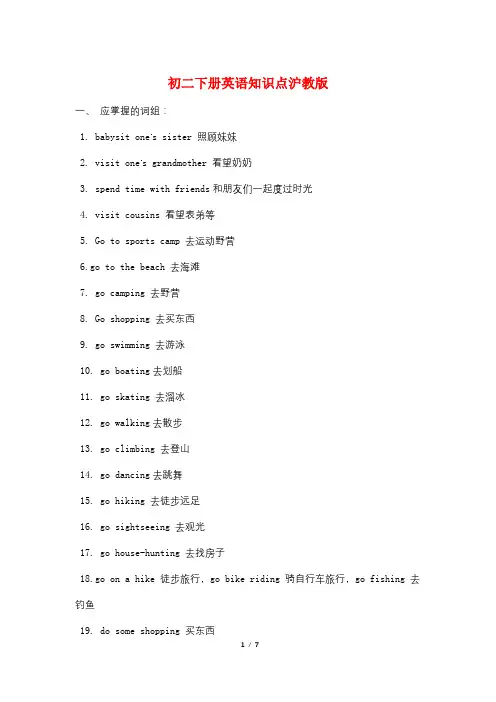
初二下册英语知识点沪教版一、应掌握的词组:1. babysit one’s sister 照顾妹妹2. visit one’s grandmother 看望奶奶3. spend time with friends和朋友们一起度过时光4. visit cousins 看望表弟等5. Go to sports camp 去运动野营6.go to the beach 去海滩7. go camping 去野营8. Go shopping 去买东西9. go swimming 去游泳10. go boating去划船11. go skating 去溜冰12. go walking去散步13. go climbing 去登山14. go dancing去跳舞15. go hiking 去徒步远足16. go sightseeing 去观光17. go house-hunting 去找房子18.go on a hike 徒步旅行,go bike riding 骑自行车旅行,go fishing 去钓鱼19. do some shopping 买东西20. do some washing 洗衣服21. do some cooking 作饭22. do some reading 读书23. do some speaking训练口语24. do some sewing 做缝纫活25.that sounds nice 那好极了26. at home 在家27. how about=what about ……怎么样?28. how long 多长时间29. how far 多远30. how often 多长时间一次31. how much, how many 多少32. have a good time =have fun= have a wonderful time= enjoy oneself 玩得快乐,过得愉快give me the book=give the book to me 给我书,pass me the cup=pass the cup to me 把杯子递给我,sell me the house=sell the house to me 把房子卖给我buy me a book =buy a book for me 给我买书,make me a cake=make a cake for me给我做蛋糕44. Ask her about her plans 向她询问她的方案ask sb. about st问某事45. forget to do sth. 忘记要做某事,forget doing sth. 忘记做过某事二、应该掌握的句子:1.What are you doing for vacation? I’m babysitting my sister.假期你要做什么?我要照顾我的妹妹。
沪教版八年级英语下册各单元知识点及复习
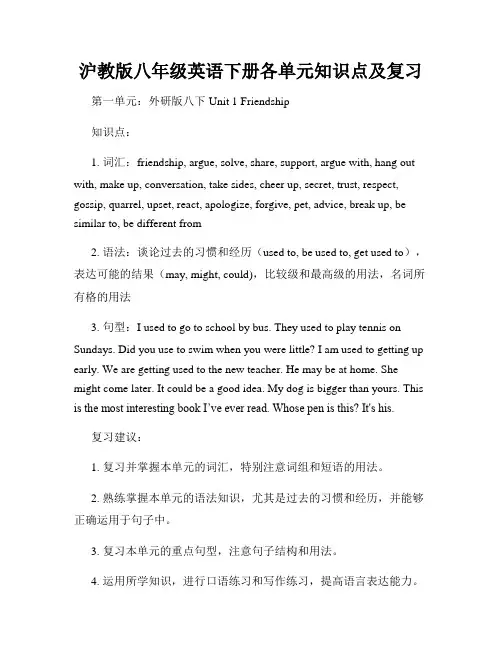
沪教版八年级英语下册各单元知识点及复习第一单元:外研版八下Unit 1 Friendship知识点:1. 词汇:friendship, argue, solve, share, support, argue with, hang out with, make up, conversation, take sides, cheer up, secret, trust, respect, gossip, quarrel, upset, react, apologize, forgive, pet, advice, break up, be similar to, be different from2. 语法:谈论过去的习惯和经历(used to, be used to, get used to),表达可能的结果(may, might, could),比较级和最高级的用法,名词所有格的用法3. 句型:I used to go to school by bus. They used to play tennis on Sundays. Did you use to swim when you were little? I am used to getting up early. We are getting used to the new teacher. He may be at home. She might come later. It could be a good idea. My dog is bigger than yours. This is the most interesting book I’ve ever read. Whose pen is this? It's his.复习建议:1. 复习并掌握本单元的词汇,特别注意词组和短语的用法。
2. 熟练掌握本单元的语法知识,尤其是过去的习惯和经历,并能够正确运用于句子中。
沪教牛津版初中英语八下教材短语句型知识点汇总
Unit 1 Helping those in need阅读:读三名学生关于他们的志愿服务工作(voluntary work义务性工作)的报告。
听力:听一个关于筹钱活动的广播节目。
语法:学习如何使用不定式。
口语:学习谈论计划。
谈论你想参加的志愿活动。
写作:给校长写一封信,报请批准筹钱。
A. 短语归纳1. in need 需要帮助的2. voluntary work 志愿服务工作3. talk about 谈论4. write a letter to sb. 给某人写信5. ask permission 报请批准6. give sb. a hand 帮助某人7. suffer from 因…受苦;受折磨8. take photos of: 给…拍照9. lots of/a lot of 许多,大量10. raise one' s spirts 使振奋;使鼓起勇气11. in the future 在将来12. in good health 身体健康13. in bad health 身体不好14. be afraid of 害怕15.so that 以便,为了16. in hospital 生病住院17. make friends with sb. 跟某人交朋友18. bring sth.to sb. 将某物带给某人19. play tennis 打网球20. on Saturday 在周六21. in order to 目的在于,为了22. because of 因为23. since then 从那时起24. pay for 支付25. stay at home 待在家里26. help sb. with sth. 在某方面帮助某人27. close to 靠近28. listen for 留心听29. talk to 和……交谈30. use...for. 把…用于……31. give sb. some advice 给某人一些建议32. take part in 参加33. millions ofa 数以百万计的B. 句型归纳1. would like to do sth. 想要做某事2. teach sb. to do sth. 教某人做某事3. offer to do sth. 主动提出做某事4. want to do sth. 想做某事5. help sb.(to) do sth. 帮助某人做某事6. continue to do sth. 继续做某事7. have difficulty(in) doing sth. 做某事有困难8. need to do sth. 需要做某事9. enjoy doing sth. 喜欢做某事10. used to do sth, 过去常常做某事11. how much+ 不可数名词多少12. decide to do sth. 决定做某事13. begin to do sth. 开始做某事14. like to do sth. 喜欢做某事15. forget to do sth. 忘记要做某事16. plan to do sth. 计划做某事17. think about doing sth. 考虑做某事18. one of+ 复数名词/代词……之ー19. be unable to do sth. 不能做某事20. learn to do sth. 学习做某事21. wish to do sth. 希望做某事22. hope to do sth. 希望做某事23. make+sb./sth.+ 形容词使某人/某物…24. Thanks for( doing)sh. 因(做)某事而感谢。
八年级下册泸教版英语知识点大全.doc
Unit 11. offer sth. 供给某物offer to do sth. 自动提出做某事offer sb. Sth. = offer sth. to sb.给或人供给某物2. lonely 孤单的表明片面上孤单alone独自的偏重独自一人,表明客观的状况alone = by oneself独自地3. enjoy 喜爱后接 n. / V-ing / pron.4. some 某种;某一后接 n.奇数5. in hospital 住院常与 be / stay 调配hospital 前加冠词表明详细的建筑物——医院6. unable = not able 不能够be unable to = be not able to 不能够⋯⋯7. attend school = go to school 上学8. since then 从那时起常放在句末,用现在完结时9. teach sb. to do sth. 教或人做某事teach sb. sth. 教或人某事10. continue to do sth. = continue doing sth.持续做某事11. have difficulty / trouble / problems (in) doing sth. 做某事有困难12. know / wonder / learn / decide + 特殊疑问词+动词不定式13. would like to do sth. = want to do sth. 乐意做某事14. wish to do sth. = hope to do sth. 期望做某事 wish 表明期望,口气比较含蓄、谦让wish sb. to do sth. 期望或人做某事15. use ⋯ for sth. / doing st用h.某物完结某事16. raise 添加;进步;筹募;哺育(及物动词)rise 上升;增强(不及物动词)17. in + 状态名词表示处于某种状态18. pay ⋯for付款⋯pay ⋯to d o付费去做某事19. 数词+ per cent of ⋯20. (in) the way + 从句以⋯⋯方式,用⋯⋯方法Unit 21. What ’t hse matter / the trouble / wrong (with sb.)? 怎么了?2. hold up 抬起;举起3. remind sb. + that 从句提醒某人⋯⋯remind sb. of 使⋯或人想起⋯⋯remind sb. about 提⋯醒或人(关于)⋯⋯remind sb. to do 提⋯醒或人做⋯⋯4. think over 细心考虑接名词时,可放在短语后或中心;接代词时,代词放在短语中心5. Why don ’t you / not do为什⋯么(? 你)不做⋯⋯?What / How about doing 做⋯⋯? ⋯怎么样?That ’s a good idea! / Good idea!had better (not) do 最好⋯(不)做⋯⋯6. feel like 想要后接n. / pron. / V-ingwant = feel like 后接n. / pron. / to do7. the key to ⋯的关⋯键⋯后接n. / V-ing18. when / while doing 当在⋯做⋯⋯的时分9. get / have a chance to do sth.有机会做某事10. go to / ask sb. for help 找或人协助11. I don ’t thin从k +句我认为⋯⋯不⋯⋯(否定前移)12. the way sb. do sth. 或人做某事的办法13. more than 不止⋯⋯;十分14. at an early age 在很小的年纪at your age 在你这个年纪Unit 31. although尽管不能与 but连用2. set off 动身;开端做某事3. be / get ready for sth.给某事做好预备be ready to do sth. 预备好做某事4. reach 抵达(及物)后接地址名词arrive in / at + 地点= get to + 地点5. require 需求;要求后接 n.require sb. to do sth. 要求或人做某事6. be made into⋯被制作成⋯⋯be made of ⋯由⋯⋯制成(看出原材料)be made from ⋯由⋯⋯制成(看不出原材料)be made by ⋯由⋯⋯(或人)制作be made in ⋯在⋯⋯(某当地)制作7. turn ⋯ into把⋯⋯⋯变成侧重突变的进程turn into变⋯成⋯⋯8. put on 表演;演出;穿上;戴上9. as ⋯ as befo像re早年相同⋯⋯as before 如早年,仍旧as ⋯ as uas ul 像平常相同⋯⋯as usual 像平常相同10. use ⋯to do用⋯⋯⋯来做⋯⋯be used to do 被⋯用来做⋯⋯11. sb. hope(s) + that 从句某人希望⋯⋯12. That is because 那是⋯由于⋯⋯13. no more = not ⋯any m不o再reUnit 41. wear = be in 穿;戴侧重“穿;戴”的状况put on 穿;戴侧重“穿;戴”的动作2. appear 看来后接n. / adj. / to doIt appears / appeared that 看起来⋯⋯⋯3. do sb. ’s voice = do the voice位of⋯⋯配音⋯4. everything, somebody, anything, everyone 等不定代词,作主语时,谓语动词用奇数办法5. pick up 拿起接名词时,名词可放在短语后或中心;接代词时,代词放在短语中心6.现在进行时表明即将产生的动作 come, go, leave, fly, arrive等7. a large / great number of许多(润饰可数名词)2a small number of 少量the number of ⋯的⋯数量(润饰可数名词)润饰主语时,谓语动词用奇数办法8. so that 以便(表意图)so ⋯ that如此⋯⋯致使(表成果)9. need to do sth. 需求做某事need sb. to do sth. 需求或人做某事10. ask sb (not) to do sth.请求/要求某人(不)做某事tell sb (not) to do sth. 告诉某人(不)做某事11. decide to do 决议去做decide + that 从句决定⋯⋯decide against 决议不做⋯⋯Unit 51. at birth = when sb. / sth. was born 出世时2. the rest of 其他的后接可数名词/不可数名词3. on one ’s own = (all) by oneself n=ea l独o 自4. spend some time (in) doing sth. 花时间做某事spend some time / money on sth. 在某事上花时刻或金钱5. as much as多达后接意以上归于不可数的可数名词(如金钱、分量、间隔等)as many as多达后接表明可数概念的可数名词复数6. stop doing sth. 停下正在做的作业stop to do sth. 停下去做某事7. else其他一般放在不定代词或特别疑问词后8. become good at变得拿手后接 n. / V-ing9. find 找到侧重找的成果look for寻觅侧重找的进程10. adj. + enough to do = so + adj. + that +从句足够⋯⋯可以做not + adj. + enough to do = too + adj. + to do(两结构中的adj. 互为反义词)11. It is + adj. + of sb. to do sth.某人做某事是⋯⋯(表示人的品质)It is + adj. + for sb. to do sth.对某人来说,做某事是⋯⋯(对动作进行评价)12. What should we do to 我⋯们应?该做什么来⋯⋯?Unit 61. see sb. do sth.看见或人做了某事侧重动作的全进程see sb. doing sth. 看见或人正在做某事侧重动作正在进行watch sb. do sth. 看见或人做了某事watch sb. doing sth. 看见或人正在做某事hear sb. do sth. 听到或人做了某事hear sb. doing sth. 听到或人正在做某事2. learn ⋯from从⋯⋯⋯学习⋯⋯后接n. / pron. / V-ing3. not all 不全是表明部分否定4. cannot do anything except / but do 除了做⋯⋯⋯什么都不能做5. die of 死于一般是指疾病、饥饿、变老等本身原因die from 死于一般指事端、意外等外部原因6. keep on doing sth. = keep doing sth.持续做某事7. until 到⋯⋯时;直到⋯⋯停止38. no longer / not ⋯ any 不lon再ge⋯r ⋯侧重表明时刻的不再连续no more / not ⋯ any m o不r e再⋯⋯侧重表明数量或程度的削减9. it ’s a good idea to do做sth某. 事是一个好主意10. stop / keep / prevent sb. from doing sth. 阻挠或人做某事11. a sense of responsibility责任感Unit 71. frightened (adj.) 害怕的修饰人frightening (adj.) 令人害怕的修饰物2. tell sb. about sth. 告知或人有关某事物的状况tell sb. sth. 告知或人某事3. wonder = want to know 想知道后接wh- +宾语从句/ wh- + to do4. refuse to do sth. 回绝做某事5. So + 助动词/be动词/情态动词+ 主语⋯⋯也⋯⋯(肯定)Neither + 助动词/be动词/情态动词+ 主语⋯⋯也不⋯⋯(否定)6. as soon as possible = as soon as sb. can / coul尽d 快7. be sure (that) 确信⋯⋯⋯be (not) sure about sth. (不)确信某事8. noise (n.) 嘈杂声(不可数);声响(可数)9. label (n. / v. )标签;贴标签10. lie (n. / v. )谎言;说谎lie –lied –lied –lyinglie (v.) 躺下lie –lay–lain –lyingUnit 81. both ⋯ and ⋯和⋯⋯⋯⋯都作主语时,谓语动词用复数办法2. be used as被用作⋯⋯后接n.be used for = be used to do sth.被用作⋯⋯后接n. / V-ingbe used by 被⋯⋯运用后接动作的执行者3. be connected to 与⋯⋯相衔接be connected with 与⋯⋯相连/有关be connected by 由⋯⋯衔接在一同4. mix ⋯with 相混⋯合be mixed with 与⋯⋯⋯混合5. on / in + a(n) / the / adj. / 形代+ 交通工具= by + 交通工具6. prepare for 预备侧重预备的进程get ready for为⋯⋯做好预备侧重预备的成果和状况7. fail to do sth. 未能做某事8. miss错失后接 n. / pron. / V-ing9. order sth. for sb. = order sb. sth.为/给或人点(餐)相似用法: cook, make , buy, draw等10. What ’s wrong / the matter / trouble with sb. / sth. = What happened to sb. / s.th11. it takes sb. some time to do sth. 做某事花或人多少时刻12. present (n. / v. / adj. ) 礼物;出席;现在的13. at the front = in the front 在前面指在某物的内部的前面in front of 在前面指在某物体的外部的前面14. recommend sth. to sb. 向或人引荐某物15. satisfy (v.) 使⋯⋯满意satisfaction (n.)满足4satisfied (adj.)满意的satisfactory (adj.) 令人满意的16. in this way这样,以这种办法on the way 在路上by the way趁便说一下17. ask for 要求;恳求ask for help 求助18. instead 替代;反而放句末instead of 替代;而不是后接 n. / pron. / V-ing19. continue to do = go on to do持续做短语收藏夹:Unit 1in need 需求协助的 voluntary work义务性作业 raise one ’s spi使rit鼓s 起勇气suffer from 因⋯⋯遭受痛苦 ask permission报请赞同 make friends with 与⋯⋯⋯交朋友tell stories讲故事 look after 照料express one ’s feelin表g达s 或人的爱情raise money 筹款 take photos of 摄影 in one ’s free tim在e或人的闲暇时刻in order to为了used to do过⋯去常常做⋯⋯have an / the activity 开展活动think about 考虑from ⋯ to 从⋯⋯⋯到⋯⋯ give sb. Permission赞同或人because of 由于pay for 付费change one ’lifes 改动或人的日子close to 离⋯⋯近 work as 担任⋯⋯作业Unit 2body language 身势语take place产生 make a good impression on给⋯⋯⋯留下好形象at the moment现在 instead of 替代 with a smile 笑着sit up 坐起来walk away 走开look down 往下看smile at 朝⋯⋯微笑at once马上feel like (doing sth.) 想要(做某事)shake hands 握手look away 移开目光shake one ’s he摇ad头nod one ’s hea点d头for a long time长时刻the key to ⋯的⋯关⋯键look into one ’s直ey视es或人的眼睛Unit 3up and down 崎岖 be good at 擅⋯长⋯⋯ set off 动身after dark 天亮后 be interested in对⋯⋯⋯感兴趣 at the front of 在⋯⋯⋯的前部up to 抵达 in the late afternoon 黄昏时分 tie ⋯ around绕⋯⋯⋯绑缚no more 不再 push ⋯ into 把⋯⋯⋯推动⋯⋯里 get ready for为⋯⋯⋯做预备bring up 哺育 stop ⋯ from doing 阻挠⋯⋯⋯做⋯⋯ all the time 一向look after 照料in the shape if 以⋯⋯⋯的形状 in the end 最终put on 演出 turn ⋯ into 使⋯⋯⋯变成⋯⋯ be made of ⋯由⋯⋯制成cut out 裁剪 close to 挨近Unit 4comic strip连环漫画video camera摄像机(be) different from 与⋯⋯⋯不同pop out张大 decide on 决议 do the voice of为⋯⋯配音think about 考虑play against 同⋯⋯⋯竞赛do sb. ’s vo为ice或人配音as well as 也 add ⋯ to 把⋯⋯⋯参加⋯⋯ put ⋯ together把⋯⋯放在一同life jacket 救生衣 be ready to do 预备好做 get ⋯ into trouble使⋯⋯堕入费事5make it获得成功weather forecast 天气预报than goodness谢天谢地pick up 拿起 look / watch out 留神 in the end 最终laugh at 讪笑 in trouble处于窘境中 end with ⋯以⋯⋯完毕be full of 充溢Unit 5in the wild 在野生环境中 at birth 出世时on one ’s ow独n 自the rest of 其他的 close to 挨近 fact file 小档案stay healthy 坚持健康 up to 多达 lose one ’s hom失e去家乡give birth to 生育 cut down 采伐 turn one ’s he转ad头look after 照料at least 至少 feel sorry about为⋯⋯⋯感到抱愧throw ⋯ at 向⋯⋯⋯扔⋯⋯ happen to ⋯产生 show a great love for对⋯⋯表现出极大的酷爱day and night 日日夜夜fall asleep 睡着take (good) care of 照顾right now 马上 hear of 传闻in memory of留念go missing 走丢look for寻觅Unit 6what’s more更为重要的是 care for 照料all the time 一向lie around懒散度日 run free 无拘无束 hold ⋯ in one ’s把a r⋯ms⋯抱住grow up长大 play with 游玩 learn ⋯ from 从⋯⋯⋯学习⋯⋯according to 依据 bark at对着⋯⋯吠 a small number of 一小部分take care of处理die of 死于(be) faithful to对⋯⋯⋯忠诚的in a moment 一瞬间 keep on持续 compare ⋯ with 将⋯⋯⋯与⋯⋯作比较keep sb. from (doing) sth. 阻止某人做某事for these reasons 出于这些原因complain about / make a complaint about 诉苦 the rest of one ’某s人life的有生之年have no choice but to do 除了⋯⋯别无选择Unit 7keep quiet 坚持安静 landing site 降落场because of 由于in fear 惊骇地 thousands of 不计其数的 happen to产生在⋯⋯身上wake up 醒来at midnight 在午夜look out of 从⋯⋯⋯往外看next to紧挨着in front of 在⋯⋯⋯前面mention ⋯to向⋯⋯提及⋯⋯run away 走开 disagree with 不赞同 as soon as possible赶快agree with 赞同 be sure about 坚信 run away from ⋯从⋯⋯逃跑get on 上in the future 在将来be pleased to do 高⋯兴做⋯⋯come from 来自on the side of 在⋯⋯⋯的一边Unit 8in the present现在at the front 在前面in the shape of 的⋯形⋯状mix ⋯ with 相⋯混合 a type of 一种类型的 be connected to 与⋯⋯相衔接be good at 擅⋯长⋯⋯ in this way 经过这种办法 recommend ⋯ to ⋯向⋯⋯引荐⋯⋯prepare for 预备in a second 瞬间communicate with ⋯与⋯⋯沟通tidy up 收拾 break down产生毛病 be different from 与⋯⋯⋯不同by post邮递 get a reply 得到回复 keep in touch with 与⋯⋯⋯坚持联系wait for 等候 have tea 喝茶 in a short time 在短时刻内go on 工作shout at ⋯朝⋯⋯叫喊6。
上海沪教版英语八年级下册第二学期知识点归纳集锦doc资料
上海沪教版英语八年级下册第二学期知识点归纳集锦第一部分:词与词组Ⅰ、重点词汇与词组1、be interested in _______________ in danger ___________________cut down ___________________ _ let out ____________________belong to ______________________ on earth _______________________keep…alive _______________________communicate with ___________________protect oneself____2、at one’s suggestion ________________ on one’s suggestion ________________make a suggestion ________________ offer a suggestion ________________on the suggestion of... ________________3、come to a decision / arrive at a decision / reach a decision ________________give a decision for ________________ give a decision against ________________make a decision ________________4、take charge of ____________ under the charge of ____________ in charge of ____________5、agree on ____________ agree with ____________ agre to (do sth) ____________6、remind sb. of sth, in addition (to), now that, be excellent for, enable sb to do sth, be covered with, feel likebe responsible for, now that, help oneself (to + food/drink/vegetable...)4、happen, take place5、frozen, freezingⅡ、词与词组辨析1、alive, living都是“活着”的意思,用法不同。
八年级英语下册沪教版重点单词
八年级英语下册沪教版重点单词1. ambition (n.) - a strong desire or determination to achieve somethingExample: She has a burning ambition to become a doctor.2. beyond (prep.) - on or to the farther side of somethingExample: The mountains extended far beyond what we could see.3. complain (v.) - to express dissatisfaction or annoyance about somethingExample: He is always complaining about his job.4. desperate (adj.) - feeling or showing a hopeless sense that a situation is so bad as to be impossible to deal withExample: The refugees were in a desperate situation, with no food or water.5. enable (v.) - to give someone the ability or means to do somethingExample: The new technology has enabled us to communicate more easily.6. fascinating (adj.) - extremely interesting or captivatingExample: The documentary about space exploration was absolutely fascinating.7. generous (adj.) - willing to give more than is necessary or expectedExample: She is always very generous and never hesitates to help others.8. hesitate (v.) - to pause or hold back in uncertainty or unwillingnessExample: Don't hesitate to ask for help if you need it.9. influence (n.) - the power to have an effect on people or thingsExample: Her parents have had a great influence on her career choices.10. loyal (adj.) - faithful and committed to a person or causeExample: Even during difficult times, he remained loyal to his friends.11. meanwhile (adv.) - during the time between two events or periodsExample: She studied for her exam. Meanwhile, her friends went to the movies.12. numerous (adj.) - many or very manyExample: There were numerous complaints about the poor service.13. overcome (v.) - to succeed in dealing with a problem or difficultyExample: She worked hard and overcame many obstacles to achieve her goals.14. persuade (v.) - to convince someone to do or believe somethingExample: He tried to persuade his parents to let him go on the school trip.15. recognize (v.) - to identify or acknowledge someone or something as known or familiarExample: I recognized her from her photograph.16. significant (adj.) - important or of consequenceExample: The findings of the study are significant and could lead to important changes.17. transform (v.) - to make a thorough or great change in someone or somethingExample: The renovation transformed the old house into a modern home.18. unique (adj.) - being the only one of its kind or having no equalExample: Each snowflake is unique and different from all others.19. valuable (adj.) - of great worth or importanceExample: The antique watch has been passed down through generationsand is very valuable.20. witness (v.) - to see or observe an event, typically a crime or accidentExample: He witnessed the car crash and gave a statement to the police.21. adapt (v.) - to make suitable for a new use or situationExample: Many plants and animals have adapted to the harsh conditions of the desert.22. assemble (v.) - to bring together and put together the parts of something Example: We assembled the furniture according to the instructions in the manual.23. benefit (n./v.) - a good or helpful result or effect; to be useful or advantageous to someoneExample: Regular exercise has many health benefits. / The new policy will benefit local businesses.24. commit (v.) - to do something illegal or wrong; to promise or decide to do somethingExample: It's a serious crime to commit fraud. / The company is committed to reducing its carbon footprint.25. consistent (adj.) - always acting or behaving in the same way; compatible or in agreement with somethingExample: She's been consistent in her support for the project. / Theresults are consistent with our expectations.26. convince (v.) - to cause someone to believe that something is trueExample: The evidence convinced the jury of his innocence.27. decorate (v.) - to make something look more attractive by adding something to itExample: We decorated the room with balloons and streamers for the party.28. efficient (adj.) - able to do something without wasting time or energyExample: The new software has made the company's operations much more efficient.29. evaluate (v.) - to assess the value, importance, or quality of somethingExample: The teachers will evaluate the students' performance throughtests and projects.30. guarantee (v./n.) - to promise that something will happen or be done; a formal promise that something will be done or that a product will be of a certain qualityExample: The manufacturer guarantees the product against defects for one year. / We can guarantee a high standard of service.31. hypothesis (n.) - a supposition or proposed explanation made on the basis of limited evidence as a starting point for further investigationExample: The scientist formulated a hypothesis to explain the unusual data.32. immune (adj.) - protected against a particular disease; not affected by somethingExample: People who have had the disease are usually immune to it. / She seemed immune to the criticism of her peers.33. impressive (adj.) - making a strong impression because of size, beauty, or skillExample: The ancient pyramids are an impressive sight.34. inevitable (adj.) - certain to happen and unable to be avoided or preventedExample: War seemed inevitable given the political tensions.35. justify (v.) - to show or prove to be right or reasonableExample: He tried to justify his actions, but no one was convinced.36. moderate (adj./v.) - not extreme, excessive, or intense; to make or become less extreme, intense, rigorous, or excessiveExample: The climate here is moderate with warm summers and mild winters. / The teacher moderated the difficulty of the exam.37. obstacle (n.) - something that makes it difficult for you to achieve what you are trying to doExample: Lack of funding is a major obstacle to the project's success. 38. permit (v./n.) - to allow something to happen or someone to do something; an official document that gives someone permission to do somethingExample: The new law will permit casinos to operate in the city. / You need a permit to park in this area.39. relevant (adj.) - closely connected or appropriate to what is being done or consideredExample: The information is relevant to the topic we're discussing.40. spacious (adj.) - having a lot of space insideExample: The new office building offers spacious and modern work environments.这些单词都是沪教版八年级英语下册中的一些重点词汇。
- 1、下载文档前请自行甄别文档内容的完整性,平台不提供额外的编辑、内容补充、找答案等附加服务。
- 2、"仅部分预览"的文档,不可在线预览部分如存在完整性等问题,可反馈申请退款(可完整预览的文档不适用该条件!)。
- 3、如文档侵犯您的权益,请联系客服反馈,我们会尽快为您处理(人工客服工作时间:9:00-18:30)。
(沪教版)初二下册英语知识点
◆unit 3 What were you doing when the UFO arrived?
知识点:
1.过去进行时
a) 过去进行时由“was/were+动词ing形式”构成。
以动词work为列,其肯定式,否定式,疑问式以及简略答语见下表:
肯定式:I/He/She/It was working. We/You/ They were working.
否定式:I/He/She/It was not working. We/You/They were not working.
疑问式和简略答语:Was I working? Yes, you were.
Was he working? No, he wasn’t.
【注意】was not常简略为wasn’t; were not常简略为weren’t
b) 过去进行时的用法:过去进行时表示过去某一时刻或某一段时间正在进行的动作。
这一特定的过去时间,除有上,下文暗示以外,一般用时间状语来表示
2.not …until直到…才。
表示动作在某时之前尚未开始,直到此时动作才开始。
not…until可以用after或when来代替,但主句谓语动词要用肯定形式。
Until为连词时后接时间状语从句,until作介词时,后面接表示时间的名词。
Until 用于肯定句多表示动作或状态一直延续到until所表示的时间为止,意思为“直到…” from..till…中till往往表示不太具体的时间。
From …to…或from…until常用来表示具体的时间。
3.find it…to do,it在此句中为形式宾语代表动词不定式,动词不定式为真正的宾语,常用于这种用法的动词有find, feel, think, make等。
4.“疑问词+不定式“结构相当于一个名词性从句,常常可用同等成分的从句代替。
改写时,只需在疑问词后面加一个适当的主语(这个主语一般与主句的
主语一致),并将不定式改成适当形式的谓语即可。
如,Where to go is still a question.= Where we should go is still a question.
5.when 与while:when连接的状语从句是个特殊句型,“前一个分句(谓语动词用过去进行时)+when(作并列连词,意思为“这时,突然”)+后一个分句(谓语动词用一般过去时)”表示在前一个动作正在进行的过程中突然发生了后一个动作,when强调动作的突然性,when后面的动词为非延续性动词;while表示“在….过程中”,强调在一段时间内,所以while引导的从句中的谓语动词必须为延续性动词。
在状语从句中,若从句放在句首时,应用逗号与主句隔开。
6.感叹句的构成:What +a/an+形容词+单数名词+主语+谓语!What a good book it is!
What+形容词+复数可数名词+主语+谓语!What easy questions they are!
What+形容词+不可数名词+主语+谓语!What cold weather it is!
How+形容词+主语+be动词!How nice the watch is!
How +副词+主语+谓语!How hard they are working!
8.take place, happen“发生”:take place指“发生事先计划或预想到的事物”;happen指“一切客观事情或情况的偶然或未能预见地发生”。
两者都是不及物动词或短语,后面不能跟宾语,也不能用于被动语态;happen的意义很广泛,而take place 仅用于历的事件,集会等,是先行布置而后发生或举行的事件,它不用于地震等自然界的现象。
happen to do 巧遇sth happens to sb某人遭遇某事
9.不定代词all, both, each,every与not连用时,只表示部分否定,在否定句中用and连接两个宾语,表语,定语,状语时,只表示部分否定,并且否定and 后面的部分;如用or连接句中两个部分,则表示全部否定。
如,She isn’t a bright and beautiful girl.她并不是一个既聪明又漂亮的女孩。
(部分否定)She isn’t a
bright or beautiful girl.她是一个既不聪明又不漂亮的女孩。
(全部否定)。
